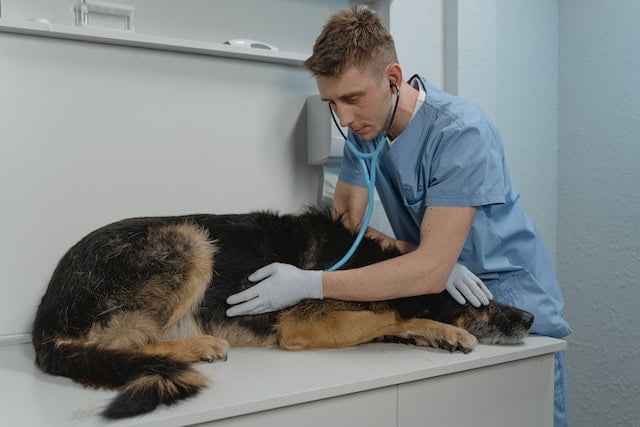My dog has worms; how do I clean my house? (2024)
Discovering that your beloved dog has worms can be distressing and unsettling. As a responsible pet owner, it’s important to address this issue promptly and thoroughly to ensure the well-being of your dog and maintain a clean and hygienic home environment. In this comprehensive guide, we will explore the question that plagues every pet owner’s mind: “My dog has worms; how do I clean my house?” Besides seeking appropriate veterinary treatment for our canine companions, it’s equally important to ensure a clean and hygienic environment within our homes to prevent reinfestation. So, let’s delve into the depths of cleanliness and learn how to banish worms from your home once and for all.
Related question>> Can you get worms from your dog sleeping in your bed?
What Are Worms, and How Do Dogs Get Infected?
Worms are parasitic organisms that can affect our dogs’ digestive systems, causing discomfort and potential health issues. They can be transmitted through various sources, such as contaminated soil, feces, or the ingestion of infected prey. By understanding the causes and types of worms, we can better address the problem and take appropriate steps to clean our homes thoroughly.
Signs Your Dog Has Worms and the Importance of Professional Help
Detecting worm infestations in our dogs is crucial for timely intervention. Common symptoms include vomiting, diarrhea, weight loss, and a change in appetite. To ensure an accurate diagnosis and effective treatment, consulting a veterinarian is essential. By addressing the issue at its root, we can pave the way for a successful cleaning process.
My dog has worms; how do I clean my house?
If you find yourself in a situation where your dog has worms and you’re wondering how to clean your house effectively, fear not! We have compiled comprehensive tips to guide you through the process and help you restore a clean and healthy environment for your furry friend and your family.
Start with your dog
Before tackling your house, it’s essential to address the primary source of the infestation: your dog. Take your dog to the veterinarian for a proper diagnosis and appropriate treatment. Follow their recommendations regarding medication and deworming protocols to eliminate the worms from your dog’s system.
Focus on cleaning pet bedding and linens
Your dog’s bedding and linens can harbor worm eggs and larvae. Begin by removing and washing all bedding, blankets, and any fabric items your dog frequently uses. Use hot water and a pet-safe detergent to ensure thorough cleaning. High temperatures help kill any remaining parasites, eggs, or larvae. Dry these items on high heat or in direct sunlight for added sanitation.
Vacuum carpets, rugs, and upholstery
Worm eggs and larvae can be present on your home’s soft surfaces. Vacuum all carpets, rugs, and upholstery thoroughly. Pay close attention to areas where your dog spends time resting or playing. Empty the vacuum cleaner immediately after each use to prevent any potential reinfestation. Consider using a vacuum cleaner with a HEPA filter for better containment of allergens and parasites.
Mop hard floors
After vacuuming, it’s time to mop your hardwood floors. Use a pet-friendly disinfectant or a mixture of warm water and mild detergent to clean the surfaces thoroughly. Pay extra attention to corners, crevices, and areas where your dog frequently visits. This step helps eliminate any remaining eggs or larvae that may have fallen from your dog or contaminated surfaces.
Sanitize frequently touched surfaces
Worm eggs can be transferred to various surfaces through contact. Wipe down countertops, furniture, doorknobs, and any other frequently touched surfaces with a pet-safe cleaning solution. This process helps eliminate any potential lingering parasites and minimizes the risk of transmission.
Outdoor Maintenance and Waste Disposal
To prevent reinfestation, it’s crucial to maintain a clean outdoor environment. Regularly remove and dispose of your dog’s waste promptly, ensuring it’s securely sealed in a bag. Avoid contact with infected soil or areas heavily contaminated with feces. Additionally, consider using products like nematodes or Diatomaceous Earth in your yard, as recommended by your veterinarian, to control parasites in the outdoor environment.
Preventive Measures for Future Infestations
Once your house is clean, it’s important to take preventive measures to keep your dog and home worm-free. Follow these tips:
- Practice good hygiene for your dog, including regular grooming and bathing.
- Administer preventive medication as prescribed by your veterinarian.
- Keep your dog’s living area clean and tidy at all times.
- Avoid contact with unknown or potentially contaminated animals.
By combining thorough cleaning, regular veterinary care, and preventive measures, you can effectively clean your house when your dog has worms and minimize the risk of future infestations.
Do I need to treat my house if my dog has worms?
Yes, it is important to treat your house if your dog has worms. While addressing the worm infestation in your dog is essential, it is equally important to eliminate any potential sources of reinfestation within your home. Here’s why you should treat your house when your dog has worms:
To prevent reinfestation
Worms can leave eggs and larvae in your dog’s bedding, carpets, floors, and other surfaces they come into contact with. If these areas are not thoroughly cleaned and treated, the eggs and larvae can survive and potentially infect your dog again, leading to a cycle of reinfestation. Treating your house helps break this cycle and prevent further infestations.
To protect human health
Some types of worms that affect dogs can also pose a risk to human health. For example, certain intestinal parasites can be transmitted to humans through contact with contaminated surfaces or when practicing poor hygiene. By treating your house, you create a safe and hygienic environment for your entire family, reducing the risk of human infection.
To ensure a healthy living space
Maintaining a clean and healthy living space is important for the overall well-being of everyone in your household, including your dog. By treating your house, you eliminate potential sources of parasites, bacteria, and other pathogens, creating a more hygienic and comfortable environment for both you and your furry friend.
To break the life cycle of worms
Treating your house disrupts the life cycle of worms. By eliminating the eggs and larvae from your home, you prevent them from maturing into adult worms and reinfesting your dog. This step is crucial to fully eradicating the worms from your dog’s environment.
Can I touch my puppy if he has worms?
Yes! Although it’s understandable to have concerns about touching your puppy if they have worms, rest assured that with proper precautions, you can still enjoy bonding with and nurturing your pet. But first, here’s what you need to know:
- Seek Veterinary Guidance: If you suspect or know that your puppy has worms, it’s essential to consult your veterinarian. They will provide professional advice tailored to your puppy’s specific situation. Follow their recommendations regarding treatment, hygiene practices, and handling.
- Practice good hygiene: Maintain good hygiene practices to minimize any potential risks. Wash your hands thoroughly with soap and warm water before and after touching your puppy. This simple yet effective step helps prevent the spread of parasites and ensures your own well-being.
- Take preventive measures: Follow your veterinarian’s instructions for deworming medications and preventive care. Regularly administer prescribed medications to your puppy as directed. These measures help eliminate the worms and reduce the likelihood of transmission.
- Minimize exposure to feces: Limit direct contact with your puppy’s feces to minimize any potential contamination. Wear gloves or use a pooper scooper when cleaning up after your puppy. Dispose of the waste properly, ensuring proper containment and hygiene.
- Maintain a clean environment: Keep your puppy’s living area clean and hygienic. Regularly clean their bedding, toys, and any surfaces they come into contact with. Disinfect these items to prevent the spread of any remaining eggs or larvae.
- Regular veterinary check-ups: Schedule regular check-ups with your veterinarian to monitor your puppy’s health. They will assess the progress of the treatment and provide guidance on when it is safe to resume normal interactions without the risk of transmission.
Can I get worms from my dog sleeping in my bed?
Yes, it is possible for certain types of worms to be transmitted from dogs to humans, but direct transmission through sleeping in the same bed is uncommon. However, it’s always a good idea to maintain proper hygiene practices, regularly deworm your dog, and consult with a veterinarian to ensure both your and your dog’s well-being. To learn more about this topic, check out this article.
If my dog has worms, do I need to treat myself?
If your dog has roundworms, hookworms, or whipworms, there is a potential risk of transmission to humans. In such cases, it is advisable to seek medical attention and potentially treat yourself. However, the risk of transmission is generally low, and practicing good hygiene can help minimize the chances of infection.
Can I sleep with my dog if they have fleas?
No, it is not recommended to sleep with your dog if they have fleas. Fleas can easily transfer from your dog to your bedding, making it uncomfortable and potentially causing flea bites on you. It’s best to address the flea issue first by treating your dog and eliminating fleas from their environment before resuming shared sleeping arrangements.
Conclusion
In conclusion, if you find yourself thinking, “My dog has worms; how do I clean my house?” Remember to consult your veterinarian, follow their advice, and prioritize regular cleaning and hygiene practices. By doing so, you can ensure the well-being of your beloved dog and maintain a clean, comfortable home for your dog and your entire family.



